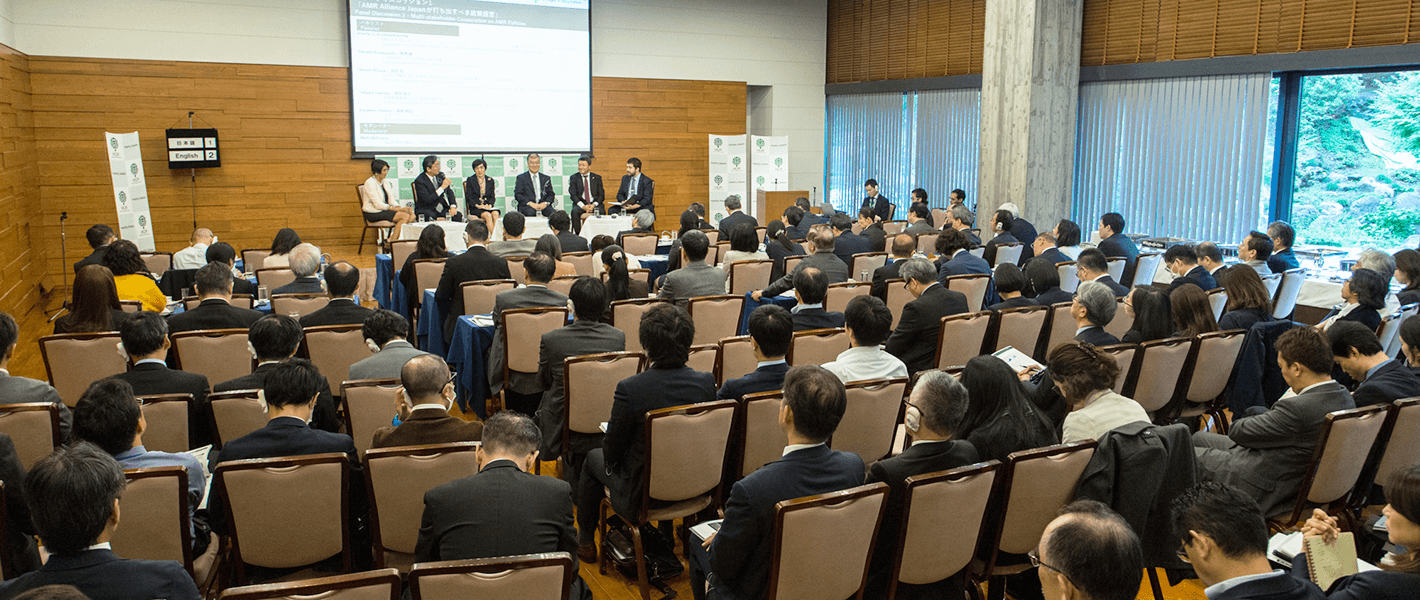[Registration Closed] (Webinar) Making the ‘Silent Pandemic’ of AMR Heard: What Countries Leading the Charge Against AMR are Doing to Ensure their Populations are Protected (April 28, 2022)
- Home >
- Information >
- Event >
- [Registration Closed] (Webinar) Making the ‘Silent Pandemic’ of AMR Heard: What Countries Leading the Charge Against AMR are Doing to Ensure their Populations are Protected (April 28, 2022)
AMR Alliance Japan (Secretariat: Health and Global Policy Institute) will host a symposium gathering experts from Japan and other countries that are leading the way in the fight against AMR. Participants from Japan, Germany, the United Kingdom, and the United States will discuss each country’s AMR response, and possibilities for future collaborations in this space.
The next infectious disease crisis is already here. Antimicrobial resistance (AMR) is a natural process by which the microorganisms that cause disease grow resistant and immune to treatment. AMR threatens to undo progress made in the development of medicine over the 20th century. Already, it is estimated to cause 1.2 million deaths annually across the world – more than the annual number of global deaths from either HIV/AIDS or malaria. In Japan, just two types of resistant bacteria – Methicillin-resistant S. aureus (MRSA) and fluoroquinolone-resistant E. coli (FQREC) – are estimated to cause over 8,000 deaths per year, which is roughly double the number of annual deaths due to traffic accidents. AMR is a serious public health issue.
This isn’t just an infectious disease problem. A lack of effective antimicrobials doesn’t just mean more deaths to infectious diseases, it means a weakening of the entire health system. Antimicrobials are crucial for the nearly 10 million people who receive cancer treatment globally every year – infectious disease is the second-leading cause of death among this immunocompromised group. Antimicrobials are often given around surgical procedures to prevent complications and help strengthen patient immune systems. This includes the 20% of women globally who give birth through caesarian section every year. The development of antimicrobials is one factor behind the sharp drop in maternal mortality in Japan across the 20th century from 400 to just 3.4 births per 100,000 annually by 2016. Likewise, antimicrobials are crucial for people living with chronic disease, who often experience weakened immune systems as a side effect of their treatments and require extra protection from opportunistic infections. Modern health systems truly depend on the existence of effective antimicrobials.
In recent years, the international community is doing more and more to address this impending crisis. We are now seeing intensive discussion on AMR through initiatives such as the G7. There are high hopes for continued action at the G7 this year during Germany’s presidency as well. The world is facing numerous challenges that require an internationally coordinated response – this includes issues such as the need to strengthen surveillance systems, enhance global antimicrobial stewardship, increase financing for AMR countermeasures, and promote efforts toward the development of novel antimicrobials that can serve as a new line of defense when existing treatments fail. International dialogue is expected to continue on these topics and more under the leadership of Germany at the G7.
Building on discussion at the G7 and elsewhere, and in light of AMR Alliance Japan’s goal of promoting international collaborations to share case studies and lessons learned about AMR, the Alliance will host a symposium gathering experts from Japan and other countries that are leading the way in the fight against AMR. Participants from Japan, Germany, the United Kingdom, and the United States will discuss each country’s AMR response, and possibilities for future collaborations in this space. Through this symposium, we hope to share international best practices for stronger policy responses against AMR, foster greater understanding about the trend of policy discussions on this issue, and help make the importance of this ‘silent pandemic’ heard.
[Overview]
■ Date and time: April 28, 2022; 18:00-19:30 JST
■ Format: Online using the Zoom conferencing system
■ Host: AMR Alliance Japan / Health and Global Policy Institute (HGPI)
■ Languages: English and Japanese (simultaneous interpretation will be provided
■ Participation fee: Free
[Program]
18:00-18:05 Welcome and Introduction
Matt McEnany (Senior Manager, Health and Global Policy Institute / AMR Alliance Japan)
18:05-18:10 Opening Remarks
Yasuhisa Shiozaki (Former Member, House of Representatives / Member, WHO Global Leaders Group on Antimicrobial Resistance)
18:10-18:20 – Looking Back on the UK’s G7 Presidency – Future Plans for AMR Policy
Sally Davies (UK Special Envoy on Antimicrobial Resistance / Member, WHO Global Leaders Group on Antimicrobial Resistance)
18:20-18:30 – AMR in Germany’s G7 Presidency
Dagmar Reitenbach (Head of Division Global Health, Federal Ministry of Health (BMG), Germany)
18:30-18:40 – AMR Policy Priorities in the United States and Across Europe
Kevin Outterson (Executive Director, CARB-X)
18:40-18:50 – Japanese Leadership on AMR Countermeasures
Norio Ohmagari (Director, Department of Infectious Diseases, National Center for Global Health and Medicine / Director, AMR Clinical Reference Center, National Center for Global Health and Medicine)
18:50 – 19:30 Panel Discussion / Q&A
Panelists
Sally Davies (UK Special Envoy on Antimicrobial Resistance / Member, WHO Global Leaders Group on Antimicrobial Resistance)
Dagmar Reitenbach (Head of Division Global Health, Federal Ministry of Health (BMG), Germany)
Kevin Outterson (Executive Director, CARB-X)
Norio Ohmagari (Director, Department of Infectious Diseases, National Center for Global Health and Medicine / Director, AMR Clinical Reference Center, National Center for Global Health and Medicine)
Eiji Hinoshita (Assistant Minister for Global Health and Welfare, Ministry of Health, Labour and Welfare)
Moderator
Matt McEnany (Senior Manager, Health and Global Policy Institute / AMR Alliance Japan)


